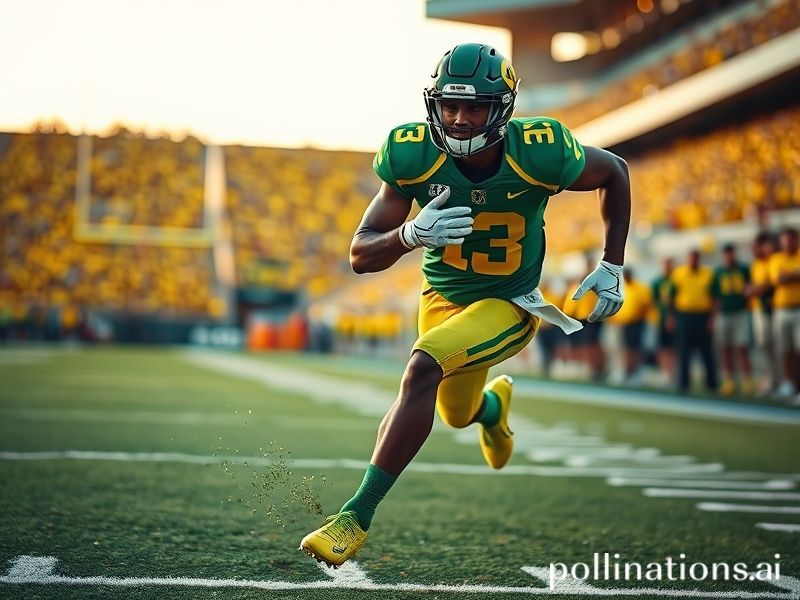From Oregon to the World: How Troy Franklin’s 40-Time Quietly Moves Global Markets
Troy Franklin, Wide Receiver, American: How One Twenty-Year-Old in Shoulder Pads Quietly Became a Data Point in Everyone Else’s Existential Crisis
By Our Man in the Cheap Seats, Somewhere Between the 50 and the Apocalypse
Picture, if you will, the planet at 3 a.m. Kyiv time, 7 p.m. in Oregon, and roughly half-past despair in most financial capitals. While grain freighters thread mine-strewn Black Sea corridors and central bankers debate whether to sacrifice inflation or employment like a Roman emperor choosing thumbs-up or down, Troy Franklin is running a 4.41-second 40-yard dash in an Indianapolis warehouse. The stopwatch clicks; satellites blink; a dozen algorithms in Seoul update their NFL Draft simulators. Somewhere in Brussels, a risk manager hedges exposure to U.S. sports-apparel stock and mutters, “Thank God he didn’t pull a hamstring.” Because in 2024, even hamstrings are macro.
Franklin—6-foot-2, 176 pounds, and still growing into his own mythology—has spent the past three seasons at Oregon turning go-routes into GIFs. Last year he caught 81 passes for 1,383 yards. Those numbers look tidy in English, but they also translate neatly into Mandarin, Hindi, and the universal language of spreadsheet green. Nike, headquartered a mere Eugene jog away, tracks his acceleration curves like the Fed tracks M2 money supply. Adidas in Herzogenaurach does the same with the zeal of a spurned lover. If Franklin sneezes, sneaker futures twitch in Singapore.
The wider world pretends not to care about college football, that provincial American opera of debt-financed stadiums and unpaid labor. Yet the supply chain begs to differ. Franklin’s next jersey will be stitched in Cambodia, photographed under LED panels powered by Qatari natural gas, and advertised to teenagers doom-scrolling in Lagos. A single viral highlight—say, a fingertip grab against Washington—generates more global ad impressions than the entire population of Belgium. The Belgians, ever polite, pretend this is fine.
Scouts compare him to a “svelte Steve Smith,” which is code for “undersized but marketable.” NFL franchises—those tax-exempt carnival acts—now hire astrophysicists to model his breakaway speed against cornerbacks who grew up idolizing Premier League strikers. The irony is thick enough to butter: American football, the sport the rest of the world ridicules for its stop-start pageantry, has become a stealth export of American soft power. Every leap Franklin makes sells not just highlight reels but an entire lifestyle: muscular, monetized, and utterly indifferent to your local time zone.
Meanwhile, geopolitics does its own route-running. The U.S. and China volley tariffs like quarterbacks checking down to short outs. Franklin’s draft stock rises and falls with the same caprice. If he lands in Dallas, Jerry Jones gets richer; if he’s traded to a streaming-obsessed London franchise, the NFL’s international revenue graph bends upward like a corner route. Either way, a 20-year-old kid from Menlo Park, California, becomes a proxy battlefield for soft-power metrics, ESG scores, and the eternal question: How many jerseys equal one F-35?
And what of Troy himself? He says the right things—“just trying to help the team win, man”—while his Instagram stories reveal the usual athlete’s diet: Bible verses, sponsored protein shakes, and the occasional Drake lyric. The algorithm approves. Human-rights NGOs do not; they note the cobalt in his phone probably passed through Congolese hands. Somewhere, a Foxconn worker clocks overtime so Troy can tweet gratitude. The circle of modern life is less lion-king, more supply-chain ouroboros.
Still, one can’t help but admire the purity amid the circus. On any given Saturday, when the jet sweep arcs toward the sideline and Franklin plants his foot like a man rejecting gravity, the stadium holds its breath. For three seconds, the debt ceiling, the Arctic ice shelf, and your cousin’s crypto losses cease to matter. Then the tackle arrives, the crowd exhales, and ESPN cuts to commercial: a Dutch bank pitching retirement plans to Indonesians who will never see an American football game in person.
Conclusion: Whether Troy Franklin becomes the next Tyreek Hill or merely another cautionary tale of draft-bust accounting, his footprint is already global. The satellites have his gait logged, the hedge funds have his 10-yard split, and somewhere a kid in Nairobi is learning to say “slot fade” with a Californian accent. In the grand bazaar of 21st-century spectacle, even innocence is a commodity—shrink-wrapped, bar-coded, and shipped overnight. So here’s to Troy: may his routes stay sharp, his hamstrings stay intact, and his sponsors remember to pay the workers stitching the myth. The world, after all, is watching—and invoicing.







